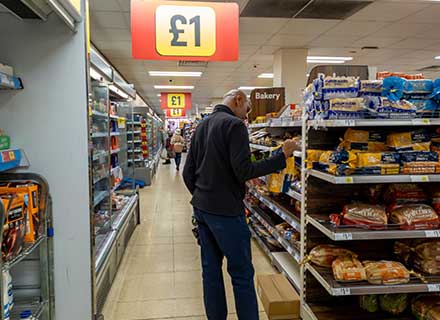Food price inflation in the United Kingdom has eased to 12.7% in July 2023, the second sharp drop in a row, as the price of milk fell back but eggs, sweets and oven chips continued to increase.
Price rises slowed for the fifth month in a row in the four weeks to 6 August, the market research group Kantar reported.
Fraser McKevitt, the head of retail and consumer insight at Kantar, told the Guardian that the 2.2% point reduction in the pace of price rises was the second sharpest month-on-month fall in inflation it had recorded since 2008.
“Prices are still up year on year across every supermarket shelf, but consumers will have been relieved to see the cost of some staple goods starting to edge down compared with earlier in 2023. Shoppers paid 1.50 pounds for four pints of milk last month, down from 1.69 pounds in March, while the average cost of a litre of sunflower oil is now 2.19 pounds, 22 pence less than in the spring,” McKevitt said.
Shoppers have also continued to find ways to offset the impact of inflation on their household budgets by switching to supermarkets’ own-label products. Sales of own-label items rose 9.7% over the four-week period, compared with a 6.4% rise in branded products, Kantar data observed further.
The consumer group Which? has called on supermarkets to stock more of their cheapest own-label products in small local stores as it found that some branded food and drink products at supermarkets had more than doubled in price in 2022.
“Mr Kipling chocolate slices and Bakewell cake slices topped its price increase league with a 129.4% and 98% jump in a year. Yeo Valley yoghurts, Quaker porridge products and Tropicana orange juice also saw price rises of over 55%,” commented the Guardian report.
The hunt for better supermarket deals has reportedly boosted discounters like Aldi and Lidl, as these grocery chains have continued to take a bigger share of spending from their rivals, thus recording the fastest pace of growth in the market, according to Kantar.
“Aldi’s sales rose 21.2% and Lidl’s 19.8% in the 12 weeks to 6 August, compared with 9.5% at Tesco, the fastest growing of the traditional chains,” the market research group stated further.
Asda’s sales rose 7.7% over the four weeks, according to Kantar, a slight slowdown in growth from that reported in the previous month as inflation across the market eased.
However, Asda’s latest figures showed that sales, excluding fuel, had risen 9.6% in the three months to the end of June 2023, with growth across food, clothing and general merchandise helped by high levels of inflation.
Asda has also reduced the loss of shoppers to the discounters after updating its loyalty scheme and expanding to its own label range, led by its cut-price Essentials line, thereby reportedly driving 14.7% growth in own brand sales.
McKevitt said that as a result of such customer behavioural changes, the average increase in households’ weekly grocery shop was 5.13 pounds compared with 2022, well below the 11.27 pounds extra it would have been if they had continued buying exactly the same items as 12 months ago.
“Cool and wet weather meant shoppers switched away from traditional summer fare to more autumnal soups and roasting joints, sales of which rose 16% and 5%. The amount of ice cream sold slumped 30%, while soft drinks sales were nearly a fifth lower than 12 months ago when the UK was basking in hot, sunny weather. Halloumi, now popular at barbecues, was down by 27%,” the Guardian report stated.
The weather put a dampener on spending in supermarkets, with growth in groceries for eating at home slipping to 6.5% in the four weeks to 6 August from 10.4% a month before.
However, supermarket chain Morrisons has continued to struggle, with sales growth of just 2.3%, with only the online specialist Ocado and independent retailers faring worse.
Meanwhile, Bank of England Chief Economist Huw Pill has warned that prices in United Kingdom supermarkets may never fall back from their painfully high levels despite the plunge in international commodity markets.
The official also predicted that “substantial” falls on global food markets will eventually feed through to shoppers, though this may only slow the pace of increases in grocery bills rather than lead to an outright drop in the cost of products.
According to Pill, the increase in the cost of raw materials and basic food items should be traced to the Ukraine war fallouts.
“Some firms decided to sort of lock in their purchases of commodities in international markets in order to reduce that uncertainty, but potentially locked in at quite high levels of prices and they’re still passing that through the system into what ultimately we’re paying for in shops,” the BoE Chief Economist stated further, while predicting that price rises will begin to slow as those contracts come to an end and food sub-processors in the United Kingdom adjust to the end of supply disruption.

